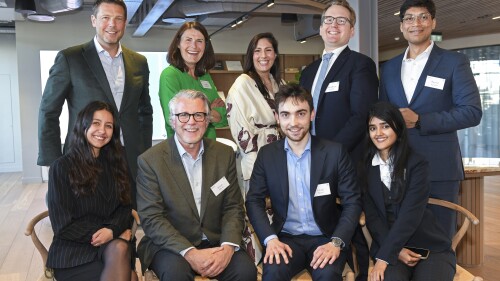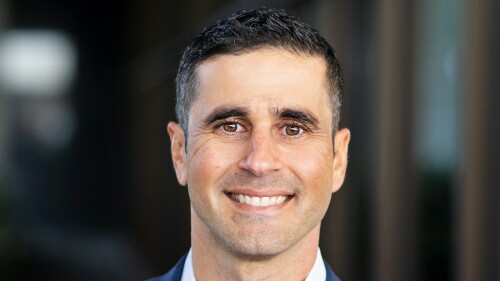Recently, Urban Land magazine sat down with Collete English Dixon, executive director of the Marshall Bennett Institute of Real Estate, and administrative chair, real estate, at the Heller College of Business at Roosevelt University in Chicago, for a wide-ranging conversation on diversity and inclusion, how far the industry has come, and what the future paths to success could look like in a diverse industry.
English Dixon, a ULI Global Governing Trustee, a member of the ULI Americas Executive Committee and DEI subcommittee; former chair of the Advisory Board for Chicago WLI (Women’s Leadership Initiative); and former chair of the Urban Development/Mixed-Use Council—Purple. She is also distinguished for her role from 2007 to 2016 as co-leader of PREI’s national investment dispositions program, responsible for managing the sale of more than $9 billion in investment properties, including hotels, industrial, apartments, office, retail, and land, on behalf of its clients.
You’re a great advocate, a great voice for diversity, equity, and inclusion in the industry. How long have you been a member of ULI?
COLLETE ENGLISH DIXON: I’m officially on my second round as a ULI member. I was a member much earlier in my career, when I was in Atlanta. Ron Terwilliger, who was still at that time leading Trammell Crow and actively involved in [ULI Atlanta], recruited me to be an associate member way back in the day.
I had no idea what this organization was about. I don’t know that I ever really absorbed what it was about until I moved to Chicago with that associate membership and started attending District Council meetings where I felt so out of place. I started my career in the South and as a relatively young woman of color in this industry in the South—I was keenly aware of the unique, limited number of people like me in the space.
Moving to Chicago and walking into a room of older, predominantly white men in gray and navy-blue suits wasn’t the problem. I just really couldn’t figure out what ULI was going to do for me, so I dropped my membership and pretty much ignored ULI. I spent a lot of my energies at that point on CREW Chicago [Commercial Real Estate Women], which seemed to have a much closer alignment with what I felt I needed.
And then around 2007, someone approached me about joining a ULI Product Council flight—Urban Development/Mixed-Use Council [Bronze Flight], which was just being created at that point. I knew I had to be a full member to do that, and I knew at that point, if you’re going to be engaged in ULI, that’s what you really needed to do. I thought that might be an interesting re-entry point and fortunately, Prudential was on board with it. There had not been another woman at that point on the investment side who’d been asked to join a Product Council, so I was a little ahead of the curve of what was going on in the firm at the time.
Given your long-term involvement with ULI, what is the organization doing right in terms of DEI and what else could it be doing to attract more diversity?
ENGLISH DIXON: I have seen ULI give more attention to DEI, and I applaud ULI’s current efforts in conducting a global DEI survey to report on the racial composition of real estate professionals in specific firms. This is the type of concrete data the industry needs. However, I think there are a couple of systemic issues we’ve got to think about. Some people of color think ULI membership is only for senior-level executives or the C-suite. It would be great for ULI to educate the industry on its inclusiveness and its composition of people at a variety of roles and professional levels, whether it’s early career, mid-career, or senior career, and also different-sized organizations, many of whom are also entrepreneurs who own their own business.
ULI could also attract more diversity by communicating the value proposition of ULI membership to people of color, especially as it would seem cost prohibitive for some. I understand that ULI is currently conducting a market study to address this issue, which is a good move. If you’re an entrepreneur, membership in ULI is a big investment of time, effort and energy. You have to believe that there’s going to be more than [that] coming back to you.
The most engaging ULI experience is to become a member of a Product Council. This type of focused involvement allows people of color to find their place more quickly as it brings the enormous size of the organization down to 50 or 60 people with whom you can interface and potentially build the sort of relationships that help promote careers and deals, which is what we’re all about. We can encourage new members who are people of color to join a Product Council that suits them best.
What is ULI doing right to address these issues?
ENGLISH DIXON: One of the great things that ULI is doing in recognition of [these issues] is to find ways to segment this organization so you can find a space to stand [such as] the smaller product councils on the District Council level, which allow people to engage in that concept locally and build similar relationships and industry participation without as much expense and time.
It is also important to have efforts around WLI [ULI’s Women’s Leadership Initiative] on the local level, to have District Councils recognize the value of young leaders. All these different subgroups—while they may look like we’re creating this fractured puzzle of stuff, gives people a different view on how they can plug themselves into a massive organization. And if they get to that comfort zone, if they find that path, then they can see a way to engage in the larger organization.
The other part is that there really aren’t that many people of color in this industry relative to the scale of it, so ULI is not really any different than NMHC or ICSC or others. All the industry trade associations are looking at the same picture asking: “Why are we having…? Why don’t we have…? What is the issue? What are the hurdles? How can we lower those hurdles to try to be more welcoming and be more inclusive and have more people of color and more women engaged in these organizations?” But we also have to build a pool of people able to do that.
How does the industry go about accomplishing that?
ENGLISH DIXON: I spend a lot of time thinking about the development of talent. And as you look at what all the trade associations are currently supporting [the drive] to help develop talent, that’s a step in the right direction.
If you wind up going through a Project Destined or Project REAP [The Real Estate Associate Program], et cetera, and you know that organization is being supported by a ULI or another trade association, you start to build a connection. But we have to get more people of color into the pathways of this industry.
Educational institutions, like the Marshall Bennett Institute of Real Estate, are part of that picture. New programs at several universities are working to expose the industry to young people of color earlier and earlier in their career visioning, so they see this as an industry that can be a good place for them. Give them that exposure, nurture that interest, get them in the pathway of educational institutions that can prepare them, mentor them, line them up with internships, recruit them to the industry on a part-time or full-time basis while they’re going through college or even high school. Get them jobs and nurture their success.
It’s that whole lifecycle—that’s how we build the talent pool. But then hopefully, because of the exposure, they join ULI as a student member, or attend an ICSC event that helps them think about their engagement with those organizations when they’re professionals. You build that. And in the meantime, you continue to create an environment where people feel included and seen and respected and that has an accretive effect on their career goals. So, you put that whole package together, it’s all the different puzzle pieces that create the better outcomes.
Can you share a bit about some of the industry conversations you have been having that reflect on the 10th anniversary of WLI?
ENGLISH DIXON: The number of women in ULI has doubled over the past 10 years, but it’s still about 30 percent of the overall membership. That is nearly reflective of the entire industry as CREW reported recently that women make up 36 percent of the commercial real estate industry. To the best of my knowledge, women are 51 percent of the population, and I’d love to see the industry and ULI get closer to that 51 percent figure.
And if we look at that number, most of that growth has not been diverse. Efforts have tended to focus on the bigger gender question, but there’s still inequity behind the scenes. Going forward it’s about working to expand awareness for diverse peoples—for diverse women—to know the pathways that can lead to wealth, and to generational wealth, and into leadership in the industry that can put them in the same positions that our esteemed male colleagues have realized.
I do think we need to recognize that the run of this industry from the seventies to now, this past 50 years, has been transformative, and that the next 50 years may not look the same. We’ve gone from being a very entrepreneurial, family-owned kind of industry to one that has spawned trillions of dollars of value around the globe and has institutionalized and expanded in a way that I don’t think anybody in the sixties or seventies ever would have thought. Do we have that same growth ahead of us? Is it going to be more challenging to see the sort of opportunity that has helped create this wealth? I would offer that how you answer those questions may influence how you engage in the industry going forward.
More women are entering the industry. More women are aware of the opportunities. If we continue to provide the space for them to grow, the space for them to develop their leadership, to exert their knowledge, we will see more positive outcomes from their leadership and their talents, but we still have a long way to go.
EDITOR’S NOTE: If you would like to become involved in or sponsor ULI’s DEI efforts, please visit our website http://americas.uli.org/dei. And if you would like to see the progress ULI has made so far, you can access our 2022 annual report.



![Western Plaza Improvements [1].jpg](https://cdn-ul.uli.org/dims4/default/15205ec/2147483647/strip/true/crop/1919x1078+0+0/resize/500x281!/quality/90/?url=https%3A%2F%2Fk2-prod-uli.s3.us-east-1.amazonaws.com%2Fbrightspot%2Fb4%2Ffa%2F5da7da1e442091ea01b5d8724354%2Fwestern-plaza-improvements-1.jpg)


